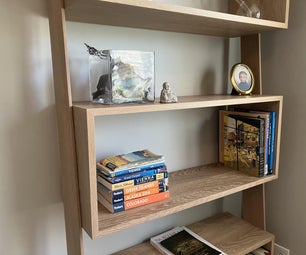Introduction: Pallet Wood Armchair for Home and Garden
I designed and made this chair for my wife's Birthday. I wanted something elegant and comfortable that she could use both in the house and which could with ease be carried out into the garden.
The most difficult part of the whole build was keeping her from finding out about it.
Having enjoyed making it and with the added bonus that she loved it, I'm now thinking of making a sofa and maybe also a porch swing in the same design. However, making them as a surprise present is going to be nigh on impossible.
Step 1: Sourcing Materials
The chair is made from untreated pallet wood, which I pick up easily from various tradespeople and shopkeepers, both of whom put them out for me when I go on a regular pallet run once a week. Most of these pallets are marked with an official looking brand mark but several small specialist shops I visit make their pallets in-house but these too are made of untreated or rather heat-treated wood. Most of what we have here is pine of various qualities but on occasions we also get oak. Some lucky people can source pallets that are made of bamboo and I think this chair design would look great in that material.
Understanding pallet 'seals' is an important factor and something you should mug-up on, is your own countries standards before you set out on your first collecting trip. There are many sites, which will explain these but I'm posting a few seals above to give you an example of what you are looking for.
This 'seal' will be located on one of the pallet blocks:
The 'wheat stamp' denotes IPPC compliance, confirming the pallet to be made of de-barked wood. Useful if you were unsure whether the wood was real!
DK - the country code i.e. in this case Denmark.
8C - the pallet manufacturer.
S5 - the treatment company.
HT - Heat Treated
on the second example, the British pallet, you will note that there is and additional code
DB - Debarked
All wooden crates and pallets in 74 countries of the world have an International Plant Protection Convention (IPPC) seal on them. These denote several things but the most important are the bottom two letters - you are looking for pallets with no chemical treatment. For example, in the US fumigation with methyl bromide, coded MB, is more common than in Europe, where we live, heat treatment (HT) is the norm. However, treated pallets do occur in Europe even though you will find several internet sites informing you they don't! In the case of chemical treatment you will also see the resultant discolouration. Many garden centre suppliers, for example, dip items or conveyor spray them and their carrier pallets simultaneously and you will see immediate evidence of this in the blue-green 'dye' infusing the whole pallet.
The other seal above is something that is becoming more and more frequent. It's the eco label for managed and sustainable forestry. I've a link at the end of this project where you can go to read all about it.There you will also find links to several articles on my website concerning the sourcing and dismantling of pallets for carpentry use.
Step 2: Materials and Tools
The actual cost for materials in money terms for this build was $1, since everything was recuperated except for a small amount of glue and a few screws. The chair can be completely made with hand tools, although as I wanted to make sure I had the chair ready for my wife's Birthday, I did resort to using a router and cutting some of the planks with a circular saw. As this was a surprise gift, using hand tools seemed a much better option and the use of the circular saw could easily be attributed to me cutting fire wood. I must admit though, I am tending more and more to use hand tools as I'm less likely to make mistakes and it makes the exercise a lot more peaceful.
With reference to cutting firewood, I planed all the wood I used to make this chair and because of this I needed to choose the best planks I could find and those with interesting knots and grain. So when working out how many pallets you'll need, it will very much depend on the quality of the individual wooden plank.
To give you a rough guide as to quantities:
I took the best planks from 3 pallets to make the seat and the back rest and
for the legs I took the 'Stringers' from a standard pallet.
Step 3: Design Criteria
My three main ideas for my chairs design were:
That it should be fit for purpose, i.e. comfortable
That it should look good
That the arm rests should be at the optimum height for holding a book.
My choice of planks and the fact that I was going to plane them and router certain edges had taken care of the second and for the first I decided that I should mock up pallets for the seat and backrest, so as to find the optimum angle and that I should at the same time work out the best depth of each for optimum support for the back and legs.
Step 4: The Chair - a Breakdown of Each Planed Wood Component & Its Assembly
The Back comprises:
6 planks/slats each measuring 20½" x 3½" x ¾" or 520mm x 90mm x 17mm
The planks are pinned to a wooden rectangle 23½" or 595mm wide and 20½" or 520mm high of 1" or 25mm square section.
The rectangle is held together with screws and faux dowel joints (more of these later)
The Seat comprises
6 planks/slats each measuring 20½" x 3½ x ¾" or 520mm x 90mm x 17mm
These are screwed directly into the rails connecting the Legs at the front and rear.
These 2 rails measure 26" x 1" x 1¾" or 25mm x 44mm x 66mm and the length includes the tenon which is one half of a mortise and tenon joint.
Each Side comprise:
A shaped arm rest fashioned from a plank 28" x 3" x ¾" or 710mm x 75mm x 17mm this is screwed into the top of each leg.
A Front Leg made from a pallet stringer 21¼" x 2½" x 1⅝" or 540mm x 63mm x 40mm
A Rear Leg from the same material 21¼" x 1⅝" x 1⅝" or 540mm x 40mm x 40mm
A stretcher or bottom rail 21½" x 1½ x 1 or 540 x 40mm x 25mm (this length includes the tenon).
The Front comprises:
The rail previously mentioned upon which the seat front sits
The Back Rail comprises:
A single length 27" or 680mm ⅝" or 15mm square section which is screwed into the undersides of the Arm Rests and into the Back Frame. This rail stops the Chair Back from pivoting on the bottom fixing screws. (It holds the back in position).
Step 5: Joining the Legs to the Stretchers/Rails - Housing Joints - Gluing and Screwing
A Housing Joint
A simple, yet very strong woodworking joint that joins two pieces of wood at right angles by cutting a slot, into one piece and fitting the other piece into it. There will be more images of this in Step 7.
I first spread wood glue into the joint, cut into each leg, to make an extra strong bond.
The stretcher is knocked into the joint in each of the the legs just by using pressure of the hand, I then placed two screws into my pre-drilled and countersunk holes and screwed them together.
Step 6: Shaping the Arm Rests
The width of the Arm Rest is just slightly wider than the front leg and is cut to a narrower width near the rear of the Arm Rest.
The narrower width is just slightly larger than the rear leg.
I made the transition between the two widths by making a 45 degree cut and achieved a pleasing radius by boring a ½" or 13mm hole. The two saw cuts were tangential to this hole.
Step 7: The Arm Rests - Using Faux Dowels Joints to Cover the Screws
Although in some parts of the chair the screws were left visible on purpose, such as in fixing the slats to the front support rail of the chair seat, in other areas I thought it more pleasing to conceal them with faux dowel joints.
To this end I cut short roundels of dowel.
Placed a little glue into each screw hole.
Hit the dowel home with a tack hammer.
Cleaned up the 'dowel joint' with the sanding block, added a little filler (glue mixed with sawdust) and sanded the whole joint again.
Now the Arm Rests are fixed to the top of the legs we have two completed sides of the Chair.
Step 8: Joining the Chair Front and the Sides - Mortise and Tenon
Mortise and Tenon Joint
A mortise and tenon comprises a peg or pin called the tenon. This is cut into one piece of wood so as to fit snuggly into a slot or hole called a mortise, which is cut into the piece to be joined to it. This joint looks like a butt joint but requires no screws or nails, and is a preferred joint of cabinet makers and carpenters.
As previously mentioned, the Arm Rests are each screwed into the end grain of the legs and these screws are then concealed beneath a faux dowel joint.
The Rear and Front pairs of Legs are now joined via a Stretcher or Rail by means of a mortise and tenon joint. This now completes the Chair Frame.
Step 9: Seat Planks and Chair Back
The Seat Planks are screwed to the front and rear Support Rails.
The Planks for the Chair Back are nailed into position using 1¼ or 30mm panel pins. These were then driven home using a nail punch and concealed with a little wood filler.
Step 10: Final Stages
The Chair Back rests on the Seat Planks and is fixed to the Rear Legs with screws.
The Chair Back at the height of the Arm Rests is screwed to the Back Rail.
We left the pine to age gracefully, which if it is often used outside will be a silver grey and most becoming. However you can put any finish on you like.
Hope you enjoyed the project.
Cheers,
Andy
LINKS
Eco Wood Label:- https://www.soilassociation.org/certification/fore...
Tips for collecting and dismantling pallets for carpentry:- https://thegreenlever.blogspot.com/p/using-repurposed-materials.html#.YNH7QbpvaV4

Participated in the
Furniture Contest













